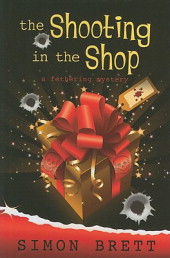Simon Brett is beloved of theater geeks of all stripes for his inspired series of mystery novels starring the so-so professional actor, accomplished amateur crimesolver and prodigious drinker Charles Paris. The Charles Paris books have satirized every aspect of acting, from West End to sitcoms to one-man shows to community theater to books-on-tape recordings (though the best work in that line Charles Paris can get is to recite random words in a dictionary database project).
Brett hasn’t penned a Charles Paris book since Dead Room Farce in 1997, which is too bad. On the other hand, the Charles Paris books have been reborn as radio adaptations starring Bill Nighy, with a different one of the adventures being broadcast every year or two since 1999. Also, in the time since he’s stopped writing so much about plays, Simon Brett has been actually writing plays, eight of which are published by Samuel French.
He’s continued to write mysteries,several a year, notably the Fethering series and the brand new Blotto & Twinks adventures. But his enthusiasm for the theater hasn’t left him, and rises up unexpectedly in the latest Fethering tome, The Shooting in the Shop (published in the U.S. by Gale/Cengage), an aging actress.
Fethering is a place, not a sleuth (or a victim). It’s a quaint British seaside village with retirement homes and the occasional slaying. In The Shooting in the Shop, an aging actress is asked about her relationship to a young woman whose dead body has just been found in a burned-out storefront.
“I gather that some newspapers have actually questioned whether you have any connection with the LeBonnier family?”
It was a bold thing to say, and the icy hauteur with which Flora greeted it would have convinced most people of her aristocratic credentials. “I don’t read newspapers,” she announced imperiously. “I never have. Journalists have no interest in the truth; they look only for character assassination and sensation.”
“But don’t you even read reviews of your performances?”
“No, I never have. What possibvle benefit can one gain from reading them? A good notice makes you question yourself to such an extent about what it was you did that was worthy of praise that you become self-conscious; while a bad notice depresses you so much that you never want to work again.”
Which is funny, because in Brett’s Charles Paris not only reads his reviews, he commits the worst ones to memory and interjects them into his commentary on the killings he’s investigating. That’s a wonderful aspect of the Charles Paris books which the Bill Nighy radio series can’t copy.

